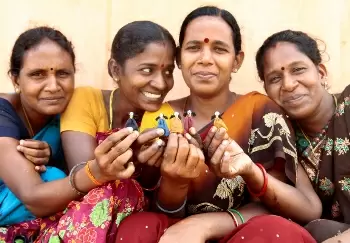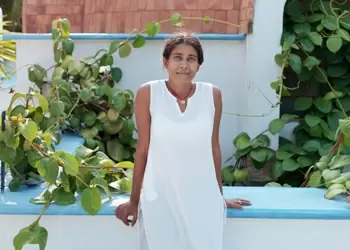She is just 10 but has gone places and given hope to the distraught

10-January-2015
Vol 6 | Issue 2
Little Tsunamika is now 10. In her short life so far, she has helped heal the hearts of women and children in the villages of coastal Tamil Nadu, set in motion a gift economy that enables many impoverished women to eke out a decent living, and spread the message of trust, empathy and goodwill across the globe.
That’s not all – not only does her story figure in the state school curricula but there is a whole book on her journey that has been translated into several languages and has also received UNESCO recognition.
 |
|
Tsunamika, a rag doll is being hand crafted for 10 years by fisherwomen who survived Tsunami in Puducherry (Photos: WFS)
|
Quite a few accomplishments for a 10-year-old, wouldn’t you say? Tsunamika is truly extraordinary, and it’s not just her various achievements that set her apart.
Fact is, Tsunamika, a child of the tsunami, is a doll! She is the innovative creation of Pondicherry-based designer Uma Prajapati, who came up with the idea while she was working with children affected by the natural disaster.
Living in the relief camps set up by volunteers from Auroville, they were deeply disturbed by the devastation they had witnessed and so Prajapati’s task was to think of activities that would not only keep them engaged but also channelise their energies into something positive.
At the time most of them were directionless and in trauma, while their mothers, in a state of shock, were unable to take out time to be with them and guide them through their pain.
Prajapati had a eureka moment when she remembered the simple doll that a young intern, Prema Viswanathan, had fashioned from scraps of textile and waste material during her stint at Upasana, the textile design studio founded by Prajapati, a few years back.
“Doll-making as a trauma counselling activity happened after a lot of reflection. Everybody likes a doll. People had lost faith in life; I thought that a doll was the thing that could rekindle emotion in them. I used it as a kind of tool, intuitively believing it would do the magic,” shares the designer who is a National School of Fashion Design (NIFT) graduate.
Incidentally, Prajapati could identify with the acute sense of loss the children and their families were feeling because just four months prior to the tsunami that struck the day after Christmas in 2004, she, too, had lost her all in a fire that burnt her home to ashes.
In fact, when she offered her services as a volunteer in the camp she herself was living in a one-room guest house generously offered to her by Ursula, an elderly Aurovilian from Germany.
At the camp, Prajapati introduced the kids to doll-making and very soon they were hooked to it. Some time later, even their mothers, who had too much to come to terms with emotionally, got drawn in as well. Besides taking away their loved ones, the killer waves had taken away the livelihoods of these fisherfolk and reduced them to victims living on dole.
“It had become a socio-economic catastrophe and the survivors were falling into a crisis that compounded the trauma of loss with a crisis in their sense of self-esteem and confidence,” remarks Prajapati. The designer and her talented team at Upasana – Vidya, Meenakshi, Vimal and Manoj – realised that trauma counselling was no longer enough. They had to figure out a respectable livelihood for these fisherwomen and wondered if doll-making could generate income for them.
They decided to pay the fisherwomen for every doll they made even though the team hadn’t yet decided on what to do with the dolls that were piling up rapidly.
Nevertheless, the doll making process was simplified and standardised into modules, and this was taught to nearly 600 fisherwomen, who, in turn, trained more women from seven coastal villages in the area. Around 200 of them wanted to make doll making their profession.
 |
|
Uma Prajapati, designer of Tsunamika doll came up with the idea while she was working with children affected by the Tsunami
|
Initially, Parajapati was gifting away the dolls to whoever visited her Upasana Studio, telling them about the dolls that were hand-crafted by the tsunami survivors.
Some people suggested that the dolls be sold to generate income for the fisherwomen, while a few others started making donations to support the cause. “It was then that Manoj had an inspiring vision of the doll going around the world. He penned his vision in the form of a beautiful poem where the doll was called ‘Tsunamika’. When I read it, I knew our doll’s name had to be Tsunamika,” she reveals.
Parajapati decided not to sell the dolls and instead to let her go around the world as gifts with people making donations if they wished, because Tsunamika represented something priceless, with deep emotional value; a symbol of hope with a healing presence. To many this decision would come across as a leap of faith but, as it turns out, her conviction has paid off.
Meanwhile, Seshadri Mohanti, a volunteer from Canada, floated the idea of building a network of Tsunamika Ambassadors, who would collect these dolls and gift them to people interested in supporting the project and then pass on the donations.
The concept spread like wildfire, a gift economy emerged and within a year, Tsunamika became a self-supporting project letting over 200 fisherwomen earn their livelihood. Today, over six million Tsunamikas have entered the world and can be spotted in diverse places, from homes to educational institutions to wedding receptions and cultural events, across 80 countries.
Of course, Tsunamika is only one of the many novel projects that the Upasana Studio is heralding at present. There’s Small Steps, Varanasi Weavers Association, Kapas, Tranquebar, Paruthi and Janaki that may have their own diverse social agendas but they all use design to achieve community development.
For instance, Small Steps involves the manufacture and dissemination of beautiful cloth bags made by village women. The idea is to motivate people to carry their own shopping bags instead of asking for plastic bags that are not environment friendly. Paruthi, on the other hand, gives a boost to organic cotton farmers.
As for Tsunamika, thanks to the adoration she evokes, she now comes associated with products such as wall hangings, greeting cards, board games, and so on.
One can source a Tsunamika by writing in to [email protected] or calling at 0413 2622939/57. Currently, Tsunamika is enabling 100 women to make a decent living.
“On an average Tsunamika received a yearly donation of nearly Rs 5 lakhs that we pass on to the fisherwomen,” reveals Prajapati, adding, “It is a small amount compared to the huge intangible wealth of positive emotions that little Tsunamika inspires.” - Women's Feature Service














